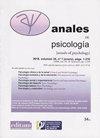减肥术后情绪障碍跨诊断治疗统一方案的应用:小组形式的有效性和可行性研究
IF 1.3
4区 心理学
Q3 PSYCHOLOGY
引用次数: 1
摘要
肥胖是一个具有全球影响的严重健康问题。减肥手术(BS)是最常用和最有效的治疗方法,但有些患者并没有失去大量的体重,这一事实与情绪饮食、焦虑和抑郁症状的存在有关。这项研究的目的是分析一种称为统一协议(UP)的基于情绪调节的干预措施的有效性和可行性,该干预措施以小组形式应用于6名出现情绪障碍/症状的BS后患者。治疗后的结果显示,高出勤率和对高分的满意度以及神经质、饮食障碍症状和情绪饮食的显著改善。在6个月的随访中,我们发现焦虑症状、神经质、失调和调节障碍(D=0.83-1.46)显著减少,体重指数随着时间的推移保持稳定。这些初步结果鼓励人们认识到UP治疗BS后患者情绪调节障碍的有效性和可行性。肥胖是一个具有全球影响的严重健康问题。减肥手术(CB)是最常用和最有效的治疗方法,但有些患者体重没有明显减轻,这一事实与情绪饮食、焦虑和抑郁症状的存在有关。这项研究的目的是分析一种称为统一协议(PU)的基于情绪调节的干预措施的可行性和有效性,该干预措施以小组形式应用于6名患有情绪障碍/症状的CB后患者。治疗后的结果显示,PU的出勤率和满意度很高,神经质、饮食障碍症状和情绪饮食有统计学意义的改善。在6个月的随访中,焦虑、神经质、适应不良和调节失调的症状明显减少(d=0.83-1.46),随着时间的推移,体重指数保持稳定。这些初步结果对PU治疗CB后患者情绪失调的可行性和有效性充满希望。本文章由计算机程序翻译,如有差异,请以英文原文为准。
Aplicación del protocolo unificado para el tratamiento transdiagnóstico de los trastornos emocionales en pacientes post-cirugía bariátrica: estudio de efectividad y viabilidad en formato grupal
Obesity is a serious health problem with global implications. Bariatric surgery (BS) is the most used and effective treatment, but there are patients who do not lose a substantial amount of weight, a fact that has been related with the presence of emotional eating, anxiety and depression symptoms. The aim of this study is to analyze the effectiveness and feasibility of an emotion regulation-based intervention called Unified Protocol (UP), applied in group format to 6 post-BS patients presenting emotional disorders/symptoms. Results at post-treatment shown high attendance rates and satisfaction with the UP scores and significant improvements on neuroticism, eating disorders symptoms and emotional eating. At 6-month follow-up we found significant reductions on anxiety symptoms, neuroticism, maladjustment and dysregulation (d = 0.83-1.46) and the body mass index remained stable over time. These preliminary results are encouraging about the effectiveness and feasibility of the UP to treat emotional dysregulation in patients after BS.
La obesidad es un grave problema de salud con implicaciones globales. La cirugía bariátrica (CB) es el tratamiento más utilizado y eficaz, pero hay pacientes que no pierden una cantidad sustancial de peso, hecho que se ha relacionado con la presencia de síntomas de alimentación emocional, ansiedad y depresión. El objetivo de este estudio es analizar la viabilidad y efectividad de una intervención basada en la regulación de las emociones denominada Protocolo Unificado (PU), aplicada en formato grupal a 6 pacientes post-CB que presentan trastornos/síntomas emocionales. Los resultados tras el tratamiento mostraron altas tasas de asistencia y satisfacción con el PU, y mejorías estadísticamente significativas para el neuroticismo, los síntomas de los trastornos alimentarios y la alimentación emocional. En el seguimiento a los 6 meses, se muestran reducciones significativas en los síntomas de ansiedad, neuroticismo, inadaptación y disregulación (d = 0.83-1.46) y el índice de masa corporal se mantuvo estable a lo largo del tiempo. Estos resultados preliminares son esperanzadores sobre la viabilidad y efectividad del PU para tratar la disregulación emocional en pacientes después de la CB.
求助全文
通过发布文献求助,成功后即可免费获取论文全文。
去求助
来源期刊

Anales De Psicologia
医学-心理学
CiteScore
3.30
自引率
5.90%
发文量
57
审稿时长
4-8 weeks
期刊介绍:
Anales de Psicologia / Annals of Psychology is a multidisciplinary journal of the various thematic areas of scientific psychology. It publishes original research articles and theoretical review in any of its basic, applied and methodological areas included within psychology.
Publishing, financing, marketing and distribution corresponds Editum: Editions of the University of Murcia (Spain). The organizational guidelines and editorial policies come from the Editorial Team (elected for four years by the Areas and / or Departments of Psychology at the University of Murcia) and the Editorial Board, composed of scholars and experts from different universities and institutions national and international. It is published in print (ISSN: 0212-9728) since 1984 and in Internet publishing (web) (ISSN: 1695-2294) since 2000. Available online full text in pdf from the vol. 1 1984.
Anales de Psicologia / Annals of Psychology maintains a system of exchange with other journals and publications of psychology in the world. Through an free exchange agreement with their respective publishers or entities responsible for editing, these journals and publications are received at the University of Murcia (Biblioteca "Luis Vives", near the Faculty of Psychology) and in return, our journal is sent to libraries and educational and research institutions such centers responsible for editing.
 求助内容:
求助内容: 应助结果提醒方式:
应助结果提醒方式:


